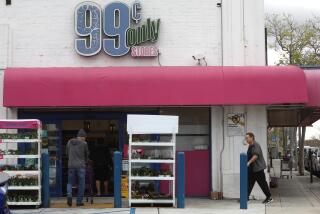Price Co. Drops Packard Bell Line : Computers: The discount retailer helped establish the Chatsworth company as a trendsetter.
- Share via
Packard Bell Electronics Inc. in Chatsworth, which last month postponed plans to go public in a $70-million stock offering, has lost a major customer.
Price Co., which operates the Price Club warehouse discount chain, recently discontinued selling Packard Bell computers because, according to Packard Bell, Price Co. wanted the computer maker to agree not to supply computers to other warehouse stores. Packard Bell said it did not want an exclusive arrangement.
A Price Co. spokesperson confirmed that the discounter no longer carried Packard Bell computers, but offered no explanation. A spokesperson for Dell Computer Corp., an Austin, Tex., personal computer maker, said that Dell recently became Price Co.’s exclusive supplier of computers.
San Diego-based Price Co. was one of Packard Bell’s first customers and helped to establish Packard Bell as the trendsetter among personal computer manufacturers in the discount club and mass merchant retail chains.
But Packard Bell Chairman Beny Alagem, in a brief telephone interview, said that over the past few years, Price Co. accounted for a declining share of the computer maker’s revenues and recently represented less than 2% of Packard Bell’s total sales.
Sears, Roebuck & Co. is Packard Bell’s biggest customer, accounting for about 18% of the computer maker’s total sales.
Alagem also said he still intends to go forward with Packard Bell’s stock offering, but has not yet set a date. He blamed the delay on the weak market for initial public offerings. However, Alagem said, if Packard Bell cannot sell its stock for between $13.50 and $15.50 a share, “we will not sell the company.”
Some observers see other problems with the proposed offering. When Packard Bell announced the offering, “I didn’t think it had a chance,” said computer industry analyst Bruce Lupatkin at the San Francisco investment firm Hambrecht & Quist.
Lupatkin said he was wary of Packard Bell’s erratic earnings record, its high rates of returned merchandise and fierce competition among personal computer makers. In 1991 Packard Bell shipped more IBM-compatible computers in the United States than any other independent company, but still managed to lose $798,000 for the year on $676 million in sales, and its total debt exceeded total assets by $4 million.
“They’re operating on very thin margins,” Lupatkin said. “Any miscue, and they’re losing money.”
Concerns have also been raised over Packard Bell’s heavy debt load and its close ties to Cal Circuit Abco, a computer parts distributor owned by Alagem and partners Jason Barzilay and Alex Sandel. The trio also founded Packard Bell in 1986.
Packard Bell and Cal Circuit Abco share a $78-million line of credit, and up to $7 million of the proceeds from the Packard Bell stock offering would be used to repay debt owed by Packard Bell to Cal Circuit Abco. The two companies have also sold products to each other and some of those sales, the company conceded in the SEC filing, “were not necessarily based on arm’s length terms.”
Countering critics, Alagem said that Packard Bell’s $93.3 million in debt is not onerous given the size of the company and the fact that it has so far raised no money from public markets. Jeffrey Scheinrock, Packard Bell’s chief financial officer, added that if Packard Bell does not go public, “the lines of credit we have can sustain the company as it is.”
Alagem also defended the relationship between Packard Bell and Cal Circuit Abco, saying it is not unusual for two privately held companies with common ownership to share close quarters.
“There is no question that when we separate Cal-Abco from Packard Bell, that Packard Bell will survive on its own and Cal-Abco will survive on its own,” he said.
The 39-year-old executive would also manage quite nicely. According to the SEC filing, Alagem paid about $2.6 million for his Packard Bell shares. If the company succeeds in selling its stock at about $14.50 a share, Alagem’s investment would be worth more than $61 million. He is also due to receive $700,000 in cash compensation this year.






